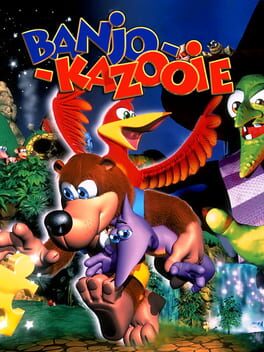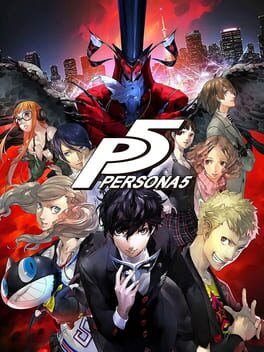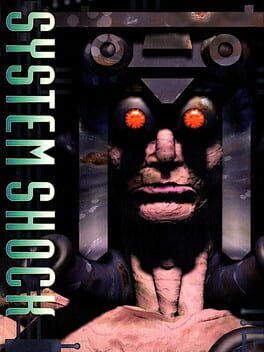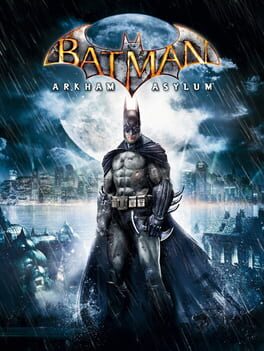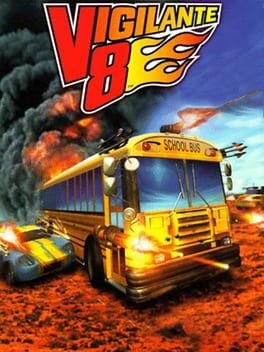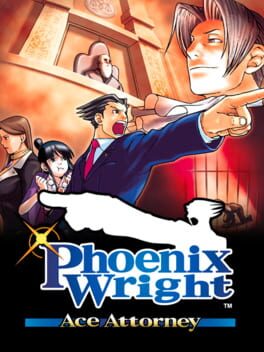Palipilino
Bio
games are fun
5★: Life-Changing Masterpiece
4.5★: Genre-Defining Classic
4★: Excellent
3.5★: Great
3★: Good
2.5★: Average
2★: Subpar
1.5★: Poor
1★: Terrible
0.5★: Literally Unplayable
games are fun
5★: Life-Changing Masterpiece
4.5★: Genre-Defining Classic
4★: Excellent
3.5★: Great
3★: Good
2.5★: Average
2★: Subpar
1.5★: Poor
1★: Terrible
0.5★: Literally Unplayable
Badges

1 Years of Service
Being part of the Backloggd community for 1 year

Pinged
Mentioned by another user

Loved
Gained 100+ total review likes

GOTY '23
Participated in the 2023 Game of the Year Event

N00b
Played 100+ games

Gone Gold
Received 5+ likes on a review while featured on the front page

Donor
Liked 50+ reviews / lists

Popular
Gained 15+ followers

Liked
Gained 10+ total review likes

Noticed
Gained 3+ followers
Favorite Games
116
Total Games Played
012
Played in 2024
006
Games Backloggd
Recently Played See More
Recently Reviewed See More
In 2005, the Batman film series was rebooted, via the work of Christopher Nolan's Batman Begins. This film, and its resulting trilogy, are considered some of the most impactful films ever made, especially in the superhero film genre. The superhero origin story became an almost overnight sensation, the phrase "dark and gritty" entered the modern lexicon, and scores of films would try (and more often than not, fail) to reach that type of grounded, realistic, darker side of comic book movies. Whether its resultant impact was a good thing on the industry or not is up for debate, but it's impossible to deny its existence. Ironically enough, just a few years later, another Batman related trilogy would begin, in another medium, that would also have quite the impact. Released in 2009, Batman: Arkham Asylum would release to universal acclaim, and was instantly hailed as a revolutionary title. It was granted a Guinness World Record for being the "Most Critically Acclaimed Superhero Game Ever," and would go on to spawn its own trilogy, just like the film series. It redefined the very idea of what a superhero game was, and its influence is still noticeable today. And wouldn't you know it? It's a pretty good game.
Open up just about any review of Batman: Arkham Asylum and you're bound to find a line about how playing the game makes you feel like the titular superhero. And while it's a cliché, a large amount of what makes this game compelling is how it feels to play as Batman; or, more accurately, how it feels to instill the same amount of fear as him. Appropriate of the character, you start the game hilariously overpowered, and the gadgets and upgrades you unlock over time only serve to sway the game more in your favor. And it works perfectly, because you get a view into how the common enemy views him; as a terrifying force. Most of the game's combat is done in stealth or semi-stealth situations, and to hear the fear and tension in the enemy voices as you pick off their colleagues one by one, under cover of night, is perfectly emblematic of how it would feel to combat such a foe. Atmospherically, Arkham Asylum nails the feel of the caped crusader; suddenly, Batman defeating a dozen enemies with ease all while remaining unseen doesn't feel unrealistic.
Now, it should be said that while these stealth sections represent the best of the combat cross puzzle solving gameplay, they do falter a bit due to enemy AI being pretty incompetent. It's a bit too easy for them to lose sight of you during combat encounters, and as a result it sometimes feels a bit clunky, rather than being too forgiving. And with everything at your disposal, you don't really need any more advantages. In some sections, of course, direct confrontation is unavoidable, and Arkham Asylum's combat system is generally up to the task. It does get quite a bit monotonous though, especially since, for all the combos and tricks you can learn, none of them feel as effective as just tapping the attack button over and over, and countering when necessary. Because of that, even though it flows well aesthetically, it's bound to turn repetitive by the end of the game. That goes double for any boss encounters, which are, without fail, unremarkable as best and just plain bad at worst. (The final boss fight, in particular, deserves special mention for delivering a completely unsatisfying conclusion.)
And that's a shame, because ironically, one of the most enjoyable parts of Arkham Asylum, especially for comic book fans, is its rogues' gallery of iconic villains. Bringing back the talents of the highly acclaimed Batman: The Animated Series was a masterstroke, and while those outside of Batman, Joker, and Harley unfortunately don't get as much screen time as they deserve, many make good use of the time they have. Scarecrow's scenes, in particular, are very impressive-though the "fight" part of it is still pretty mediocre. And for every character in the cast, there's a dozen of them alluded to, referenced as fellow inmates of Arkham, or discussed in passing. Interview tapes hidden as secrets, character bios, first comic appearances, and more all make for an incredibly detailed experience for the comic book superfan; and honestly, it's pretty enjoyable for the casual fan as well.
Batman: Arkham Asylum is a superhero beat-em-up whose combat is often lacking; that the game remains a good and fun overall experience in the face of that is quite impressive, and it owes a lot of that appeal to its detail. The world is riddled (pun, of course, intended) with secrets, easter eggs, and lore tidbits that really help expand the world. For a relatively small setting, Arkham Asylum utilizes its space well, and backtracking only rarely feels cumbersome. As a result, it's a game that feels like more than the sum of its parts, and it's easy to see why a game with such a great emphasis on atmosphere was the one to carry the torch for its generation of the superhero subgenre.
Open up just about any review of Batman: Arkham Asylum and you're bound to find a line about how playing the game makes you feel like the titular superhero. And while it's a cliché, a large amount of what makes this game compelling is how it feels to play as Batman; or, more accurately, how it feels to instill the same amount of fear as him. Appropriate of the character, you start the game hilariously overpowered, and the gadgets and upgrades you unlock over time only serve to sway the game more in your favor. And it works perfectly, because you get a view into how the common enemy views him; as a terrifying force. Most of the game's combat is done in stealth or semi-stealth situations, and to hear the fear and tension in the enemy voices as you pick off their colleagues one by one, under cover of night, is perfectly emblematic of how it would feel to combat such a foe. Atmospherically, Arkham Asylum nails the feel of the caped crusader; suddenly, Batman defeating a dozen enemies with ease all while remaining unseen doesn't feel unrealistic.
Now, it should be said that while these stealth sections represent the best of the combat cross puzzle solving gameplay, they do falter a bit due to enemy AI being pretty incompetent. It's a bit too easy for them to lose sight of you during combat encounters, and as a result it sometimes feels a bit clunky, rather than being too forgiving. And with everything at your disposal, you don't really need any more advantages. In some sections, of course, direct confrontation is unavoidable, and Arkham Asylum's combat system is generally up to the task. It does get quite a bit monotonous though, especially since, for all the combos and tricks you can learn, none of them feel as effective as just tapping the attack button over and over, and countering when necessary. Because of that, even though it flows well aesthetically, it's bound to turn repetitive by the end of the game. That goes double for any boss encounters, which are, without fail, unremarkable as best and just plain bad at worst. (The final boss fight, in particular, deserves special mention for delivering a completely unsatisfying conclusion.)
And that's a shame, because ironically, one of the most enjoyable parts of Arkham Asylum, especially for comic book fans, is its rogues' gallery of iconic villains. Bringing back the talents of the highly acclaimed Batman: The Animated Series was a masterstroke, and while those outside of Batman, Joker, and Harley unfortunately don't get as much screen time as they deserve, many make good use of the time they have. Scarecrow's scenes, in particular, are very impressive-though the "fight" part of it is still pretty mediocre. And for every character in the cast, there's a dozen of them alluded to, referenced as fellow inmates of Arkham, or discussed in passing. Interview tapes hidden as secrets, character bios, first comic appearances, and more all make for an incredibly detailed experience for the comic book superfan; and honestly, it's pretty enjoyable for the casual fan as well.
Batman: Arkham Asylum is a superhero beat-em-up whose combat is often lacking; that the game remains a good and fun overall experience in the face of that is quite impressive, and it owes a lot of that appeal to its detail. The world is riddled (pun, of course, intended) with secrets, easter eggs, and lore tidbits that really help expand the world. For a relatively small setting, Arkham Asylum utilizes its space well, and backtracking only rarely feels cumbersome. As a result, it's a game that feels like more than the sum of its parts, and it's easy to see why a game with such a great emphasis on atmosphere was the one to carry the torch for its generation of the superhero subgenre.
There's a widely reported phenomenon in people who have near-death experiences called "life review", a simultaneous and instantaneous rapid series of visions depicting memories from their past. The layman's term for such an occurrence would be to say that your life flashed before your eyes. And, presumably, if this sensation occurs for each near-death experience, then there's reason to believe that it would occur in actual-death experiences as well. The appropriately named Before Your Eyes, the debut title from indie developer Goodbyeworld Games, tackles this theory head-on. Playing through the eyes of Benny Brynn, you awaken in a purgatory-like space, where you recall the story of your recently ended life. It's certainly an interesting concept on its own, but the real draw of BYE is the way you interact with it; instead of a typical story based game where you click through text, progression is controlled by your eye movements. And this is not just in game, either; the game progresses with your blinks-as in you, the player. Utilizing webcam technology, Before Your Eyes is able to tell a short and often touching story, in an incredibly innovative way.
Of course, with such a unique gameplay progression aspect, that is naturally the area that discussion of the game generally focuses on. Before Your Eyes plays out as a series of memories where your interaction is limited; for the most part, you are watching memories play out chronologically throughout your character's life. And just as with real memories, their relevance is inconsistent; they're just as likely to be character defining moments as they are to be one off, random thoughts. In that way, BYE creates a unique sense of relatable nostalgia; everyone has those memories from childhood that seemingly offer nothing other than the fact that they're remembered. And similarly, the story progresses in a relatable yet bittersweet way. After a certain point in each memory, blinking will progress to the next one, and often, you feel the urge to blink before everything in the memory actually happens. Some cases will have you straining your eyes, trying to force them to stay open, just to see what happens next, just to stay in the moment for a second longer. Especially considering that these are the memories of a recently deceased person, it adds a layer of somberness; just as you (the player) want to see everything that happens in the game, the character is trying to cling to their last memories before they end up passing on.
Here's the thing though; as innovative and immersive as the blinking-as-gameplay concept is, and as well as it works narratively, it's still unfortunately faulty, even with the best webcam. Quite a few times you'll find the game progressing even when you aren't blinking, and the tracking works inconsistently unless you are constantly keeping direct eye contact with your screen. It's understandable that an indie developer utilizing such an idea would not be able to perfect it on its first try, but nevertheless it can unfortunately detract from the experience and cause the player to miss key story points, which in heavily narrative-driven games such as BYE, is quite a large setback. There is an option to disable the blink-based progression, but that removes far too much of the game's personality and uniqueness to really be considered a viable option.
The narrative is quite good, though, and it's worth suffering through the potentially frustrating controls to experience at least once. Before Your Eyes is certainly a game that should be played blind (excuse the pun), and it's pretty easy to breeze through in one or two sittings. It's full of impactful and relatable moments that are bound to trigger thoughts of your own childhood. The twists are a little obvious to see coming, and as a result BYE can sometimes struggle to make the long-lasting impact that it's aiming for, but it provides a unique way to experience the medium of video games throughout its short runtime. Its narrative premise is a bit generic and it seems designed more to overwhelm your emotions rather than create a genuinely compelling story, but its innovative approach towards gameplay and evoking nostalgic feelings do enough to make it a good and meaningful experience.
Of course, with such a unique gameplay progression aspect, that is naturally the area that discussion of the game generally focuses on. Before Your Eyes plays out as a series of memories where your interaction is limited; for the most part, you are watching memories play out chronologically throughout your character's life. And just as with real memories, their relevance is inconsistent; they're just as likely to be character defining moments as they are to be one off, random thoughts. In that way, BYE creates a unique sense of relatable nostalgia; everyone has those memories from childhood that seemingly offer nothing other than the fact that they're remembered. And similarly, the story progresses in a relatable yet bittersweet way. After a certain point in each memory, blinking will progress to the next one, and often, you feel the urge to blink before everything in the memory actually happens. Some cases will have you straining your eyes, trying to force them to stay open, just to see what happens next, just to stay in the moment for a second longer. Especially considering that these are the memories of a recently deceased person, it adds a layer of somberness; just as you (the player) want to see everything that happens in the game, the character is trying to cling to their last memories before they end up passing on.
Here's the thing though; as innovative and immersive as the blinking-as-gameplay concept is, and as well as it works narratively, it's still unfortunately faulty, even with the best webcam. Quite a few times you'll find the game progressing even when you aren't blinking, and the tracking works inconsistently unless you are constantly keeping direct eye contact with your screen. It's understandable that an indie developer utilizing such an idea would not be able to perfect it on its first try, but nevertheless it can unfortunately detract from the experience and cause the player to miss key story points, which in heavily narrative-driven games such as BYE, is quite a large setback. There is an option to disable the blink-based progression, but that removes far too much of the game's personality and uniqueness to really be considered a viable option.
The narrative is quite good, though, and it's worth suffering through the potentially frustrating controls to experience at least once. Before Your Eyes is certainly a game that should be played blind (excuse the pun), and it's pretty easy to breeze through in one or two sittings. It's full of impactful and relatable moments that are bound to trigger thoughts of your own childhood. The twists are a little obvious to see coming, and as a result BYE can sometimes struggle to make the long-lasting impact that it's aiming for, but it provides a unique way to experience the medium of video games throughout its short runtime. Its narrative premise is a bit generic and it seems designed more to overwhelm your emotions rather than create a genuinely compelling story, but its innovative approach towards gameplay and evoking nostalgic feelings do enough to make it a good and meaningful experience.
By the mid 90s, video game enthusiasts were no stranger to vehicular combat in car based games, but if you really wanted to get in on the action, you'd usually have to settle for a predominantly racing-focused game, with the combat either happening mid-race, or being shoved off into a side mode. Then, when Twisted Metal popularized the strictly demolition derby-type gameplay, it became more and more apparent that 90s kids were really interested in, well, destroying things. Its influence was certainly noticeable in a fair amount of later 5th gen titles, and one of the most prominent was Vigilante 8. Released for both the PS1 and the N64, it was the choice for many Nintendo fans who didn't have access to the Twisted Metal series, but it also picked up a fair amount of fans on Playstation as well. As it stands, it's a pretty good time capsule into the multiplayer mayhem that was the late 90s, and certainly has more than enough jank to go along with it.
Even with its admittedly strong inspiration from Twisted Metal, one of the best things Vigilante 8 has going for it is its character. It's set in the mid 70s (appropriately, the heyday of demolition derbies as well) and features muscle cars, funky music, and caricatures appropriate of the era. It was something that was probably already strangely nostalgic upon release, and another couple decades haven't hurt either. Its characters are, if one-note, pretty memorable, and the random assortment of cars here will mean that everyone can find something they like. The levels are, as was tradition at the time, outfitted with mini-secrets which grant you special weapons, and while they're not anything special, they generally get the job done.
The game offers a quest mode and a versus mode, and while the single player addition is nice in principle, it's nothing other than a way to unlock characters or play 4 of the versus modes in a row. The single player mode is incredibly short, and beating it with one character can be done in a few minutes; still, in order to unlock everyone, it's incredibly repetitive to have to play through it a dozen times. A more fleshed out campaign with multiple missions and, crucially, multiple mission objectives would have gone a long way to alleviate the tedium there.
At the end of the day, all you're really doing in this game is blowing up cars, and while the game struggles to make it as interesting as it sounds in single player, it's certainly a whirlwind in multiplayer. It's got that type of couch co-op energy that only its contemporaries do. The game is fun almost in spite of itself, but fun nonetheless, and it's easy to see how you could pass the time with Vigilante 8 and a couple of controllers. Still, though, it's a pretty one-note experience, and while that's certainly not a problem if the experience is good, it's got that signature 90s jank and lack of polish that makes it frequently frustrating. The physics system is questionable at best, and clipping through walls, ramps, and other enemies happens pretty often. The controls are pretty weak, even for pre-Dualshock PS1 standards, and you'll find yourself spending more time spinning around in a circle trying to aim at your enemy rather than actually firing weapons at them. For some of the bigger maps, this can create an even bigger issue, as usually the more time spent experiencing the actual driving and environment interactions, the worse. Weapons are not particularly varied, nor are they that satisfying to use; save for special weapons, which add a nice degree of personality.
Vigilante 8, then, probably joins the rather large list of games that you kind of had to be there to properly enjoy. Perhaps due to its sequel, it retained a small but dedicated fanbase without a single release since the millennium, and that's impressive in its own right. Playing a quick round or two with your friends, you can certainly see where the enjoyment comes from, and it can even help to tickle that nostalgic feeling you might have for its generation. It's an arcade-style game with an interesting concept, but it doesn't have the stability or the foundation to make its gameplay consistently enjoyable. Not poorly made enough to be called a crash and burn, but it's certainly missing a fair degree of parts.
Even with its admittedly strong inspiration from Twisted Metal, one of the best things Vigilante 8 has going for it is its character. It's set in the mid 70s (appropriately, the heyday of demolition derbies as well) and features muscle cars, funky music, and caricatures appropriate of the era. It was something that was probably already strangely nostalgic upon release, and another couple decades haven't hurt either. Its characters are, if one-note, pretty memorable, and the random assortment of cars here will mean that everyone can find something they like. The levels are, as was tradition at the time, outfitted with mini-secrets which grant you special weapons, and while they're not anything special, they generally get the job done.
The game offers a quest mode and a versus mode, and while the single player addition is nice in principle, it's nothing other than a way to unlock characters or play 4 of the versus modes in a row. The single player mode is incredibly short, and beating it with one character can be done in a few minutes; still, in order to unlock everyone, it's incredibly repetitive to have to play through it a dozen times. A more fleshed out campaign with multiple missions and, crucially, multiple mission objectives would have gone a long way to alleviate the tedium there.
At the end of the day, all you're really doing in this game is blowing up cars, and while the game struggles to make it as interesting as it sounds in single player, it's certainly a whirlwind in multiplayer. It's got that type of couch co-op energy that only its contemporaries do. The game is fun almost in spite of itself, but fun nonetheless, and it's easy to see how you could pass the time with Vigilante 8 and a couple of controllers. Still, though, it's a pretty one-note experience, and while that's certainly not a problem if the experience is good, it's got that signature 90s jank and lack of polish that makes it frequently frustrating. The physics system is questionable at best, and clipping through walls, ramps, and other enemies happens pretty often. The controls are pretty weak, even for pre-Dualshock PS1 standards, and you'll find yourself spending more time spinning around in a circle trying to aim at your enemy rather than actually firing weapons at them. For some of the bigger maps, this can create an even bigger issue, as usually the more time spent experiencing the actual driving and environment interactions, the worse. Weapons are not particularly varied, nor are they that satisfying to use; save for special weapons, which add a nice degree of personality.
Vigilante 8, then, probably joins the rather large list of games that you kind of had to be there to properly enjoy. Perhaps due to its sequel, it retained a small but dedicated fanbase without a single release since the millennium, and that's impressive in its own right. Playing a quick round or two with your friends, you can certainly see where the enjoyment comes from, and it can even help to tickle that nostalgic feeling you might have for its generation. It's an arcade-style game with an interesting concept, but it doesn't have the stability or the foundation to make its gameplay consistently enjoyable. Not poorly made enough to be called a crash and burn, but it's certainly missing a fair degree of parts.
